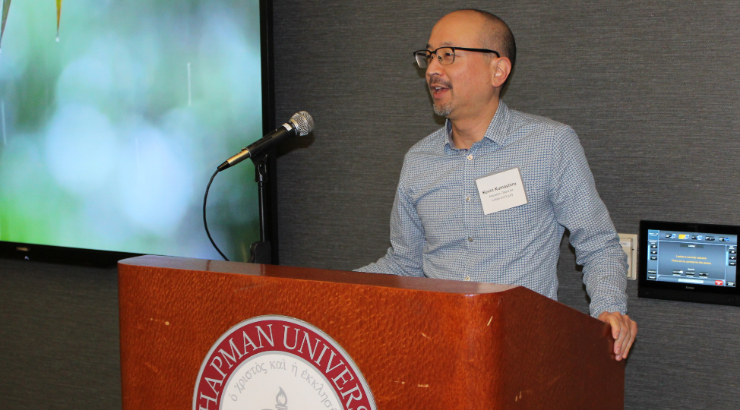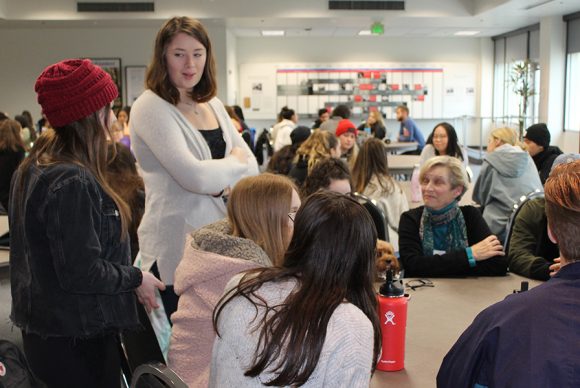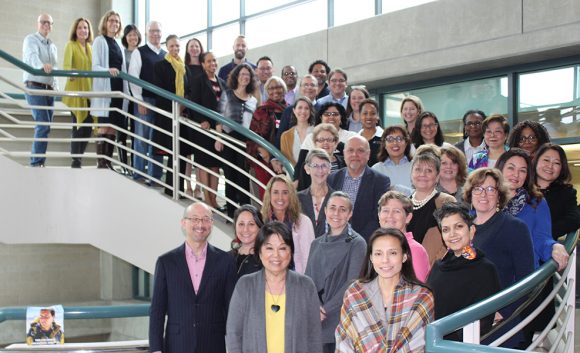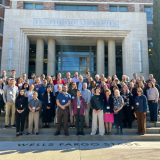
Broadening Boundaries and Challenging Preconceptions Expert Guest Lecturer Speaks to Attallah Students on Current State of Education
February 1, 2019
Why do American K-12 schools run from 8 am to 2 pm? Why do we so often teach 50 minutes of math and then 50 minutes of reading?
In a special guest lecture, internationally recognized expert on educational policy, school reform, and equity and social justice Kevin Kumashiro, Ph.D., spoke to Chapman students in a combined session of three Attallah College of Educational Studies IES (Integrated Educational Studies) interterm courses. He challenged the future educators to ask these questions and more, to take a deeper look at the purpose, function, and historical contexts of the US public education system.
“Why does school look like this?” he asked. “We should be questioning things that we often take for granted.”
Taking Stock of Today
Besides considering and questioning the accepted norms and practices in 21st century education, during his lecture, Dr. Kumashiro spoke about various lens through which to explore the challenges and paradoxes of learning. The first step to meaningful reform and improving learning for all students he explained is understanding “the moment that we are in.”

Attallah IES students attending Dr. Kevin Kumashiro’s guest lecture
“There’s no compelling body research that tells that many of the currents models of schools and curriculum are the best. These are all historical products that have persisted.”
Ultimately, the goal was to encourage the Chapman students to think about education differently. Dr. Kumashiro explained that there are many different ways of teaching and they all have strengths and weaknesses.
“Education at its core is about rattling what has become come the common sense of our time,” he argued. “Education shouldn’t be about teaching us to fit into the world as it is. It should be about preparing us to imagine and create the world that is not yet, the world as it could be.”
Understanding this can help educators meets the needs of all the students in their classrooms, whether they are preschoolers or adult learners.
Making it Personal
Throughout his lecture, Dr. Kumashiro interspersed pause periods during which students discussed the topics in roundtables, asking them to identify ingrained assumptions in modern education. More importantly, the students were encouraged to relate the concepts to their own experiences.
“Our life experiences are constantly creating unique lens that we look through to make sense of the world around us, lens that are colored by our upbringing, experience, cultural background, and professional training,” he explained. “The goal of education isn’t to get you to insist that your lens is correct, nor is it get you to buy into my lens. The goal of education is to get us to see how every lens is partial and allows us to see only partial things.”
Chris Costa, a senior Chapman student taking IES 300 (Valuing Differences in American Society), thought Kumashiro’s lecture was incredibly valuable.
“I really like the way he reframes the current educational system. I feel like a lot of the things that we are doing we’re just set in. We’ve kind of accepted this is how you test and this is how you rank people,” he said. “We’re in 2019, and what are people going to say in 50 years? It’s really important to ask these kinds of questions. Realistically our generation is going to be the one to actually change that. He was fantastic. This is important stuff.”
Education Deans for Justice and Equity
In addition to being an internationally recognized expert on educational policy, and school reform, Dr. Kevin Kumashiro is the author and editor of 10 books, including Against Common Sense: Teaching and Learning toward Social Justice (Routledge, 2015) and Bad Teacher! How Blaming Teachers Distorts the Bigger Picture (Teachers College Press, 2012).

EDJE January 2019 meeting at Chapman University
He is also a fellow of the National Education Policy Center and a founding member of EDJE (Education Deans for Justice and Equity). This guest lecture was scheduled in conjunction with an EDJE gathering held in January at Chapman University. At the recent EDJE meeting, Chapman’s Attallah College hosted more than 40 deans and higher education leaders from across the United States.
One of the goals of EDJE is to establish a framework for colleges and schools of education that raises awareness and establishes a shared understanding of the complexity of issues surrounding inequities and injustices in educational settings.
Margaret Grogan, Ph.D., Dean of the Attallah College and another founding member of EDJE, said “It was a privilege to host the EDJE meeting, and we are so glad Kevin was able to share his insights and expertise with our students.”

